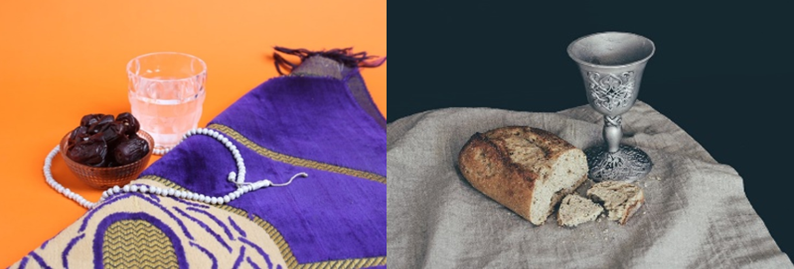
The following log is being presented in a series of weekly installments. To read this document in its entirety, please visit philchurch.substack.com
We have been “observing” both Christian Easter Season and Muslim Ramadan this year. The choice was ours but then maybe, as part of some divine equation, it was not. Whatever, it has been a rewarding and fulfilling experience, one worth sharing. Notice that we put “observing” in quotes, because the month-long sun-up-to-sun-down fasting part of Ramadan is a bit more than we can handle. (Certain exemptions from fasting exist, of course, for the pregnant, elderly and the infirm among others.)
Our Ramadan observations began on Friday afternoon, April 1. That day Phil responded to a knock on the door, opened and welcomed HM into our home. Twenty-seven-year-old HM is part of the second wave of Afghan evacuees to arrive in America since August 2021. He left Kabul, Afghanistan in January 2022 for Islamabad, Pakistan where the US Embassy arranged for him to fly to a US military base outside Doha, Qatar. There, he underwent background checks, physical exams and vaccinations, and processing of his special immigrant visa (SIV) application.
In mid-March HM boarded a Qatar Airlines flight to Dulles International where he was met by his US sponsoring organization, Catholic Charities of the Diocese of Arlington which arranged short-term lodging for him and for some other Afghan evacuees at an Arlington hotel. When his US government-funded lodging allowance was exhausted, HM was expected to find other living arrangements that he could afford – not an easy task in Northern Virginia, one of the region’s most expensive and competitive housing markets.
HM is now our houseguest. We’re getting to know this interesting and intelligent young man, supporting his efforts to resettle in America, learning about the troubling challenges facing his parents and siblings still living in Kabul, Afghanistan, and meeting some of his friends from the growing Afghan diaspora here in Northern Virginia. The following is a daily log of events surrounding HM’s stay with us during the month of Ramadan.
[Note: As a precaution against possible repercussions by the Taliban government against family members remaining in Afghanistan, US State Department protocols urge that, until safe to do so, communications, particularly electronic media use initials in place of full names of Afghan refugees resettling in the US.]
WEEK 1 – GETTING ACQUAINTED
DAY 0 (THURSDAY, MARCH 31) – A phone call. It’s Thursday afternoon when Phil’s cell phone rings. On the other end is NF, a former Afghan employee of the US Embassy in Kabul with whom Phil is working on his job search. NF is resettling in America with his wife and three daughters. They arrived in the US as evacuees in September and settled into housing in Pittsburgh, PA. Phil hasn’t talked with NF for a few weeks, not since NF started working.
NF is calling with a request. A former work colleague in Kabul, HM, arrived in Virginia three weeks earlier. HM has now exhausted his two-week lodging allowance but has not yet found a place to live on his own or with friends. He does not yet have documents needed to work or to rent an apartment here. NF asks if can Phil talk to HM and see if there is anything he could do to help him find a place where he can afford to live. Phil agrees to talk to HM.
Within an hour HM calls Phil. He explains he can’t afford the hotel’s nightly room charge that his resettlement agency had been paying up to that time. His Afghan friends in the area have large families in small apartments; they just can’t take him in. HM is open to whatever Phil can suggest as to a cheaper place he might stay while he gets his papers in order and conducts his job search. He needs to check out of his hotel by noon the next day, Friday, also the day before the month-long Muslim Ramadan begins. Phil and HM exchange email addresses. Phil asks HM to send his resume.
Off the phone with HM, Phil calls the Catholic Charities office to inquire about HM’s refugee status but no one answers and all voice mail boxes are full, an indicator most likely of just how overwhelmed are the nine nonprofit agencies contracted nation-wide by the US government to resettle arriving Afghan refugees. Phil emails the organization but is not hopeful for an immediate reply. He has the evening to ponder the situation; he calls to consult Connie who is at our daughter’s townhouse for some mother/daughter time together. Phil and Connie concur that, absent any other viable options, HM could stay with us for awhile.
DAY 1 (FRIDAY, APRIL 1) – HM arrives. Phil’s morning is hectic. He reaches out again to Catholic Charities and is now able to leave a voice message and email address. By late morning he does get a proforma email message back that it is the organization’s policy not to release to third parties any information about its clients. Dead end, but understandable. Phil calls HM’s cell to see if he has been able to make any alternative living arrangements. None. Phil looks over HM’s resume. It indicates a college degree in computer sciences with lots of IT certifications and work experience with USG contractors in Kabul. The resume is well-written, reflective of the very good English with which HM communicates over the phone.
Phil invites HM to stay at our house in one of our empty-nester bedrooms. He offers to come to the hotel to get HM and his things. HM accepts the offer to stay with Phil and Connie but indicates that one of his Afghan friends will bring him to our home.
HM arrives with his Afghan friend, JN, who came to the US two years earlier and is living in Alexandria in a small apartment with his wife and six school-age children. Phil invites both HM and JN in and they settle into the sunroom for some tea and cookies and a brief chat. Phil senses that he is being sized up by both HM and JN who likely are a bit uncomfortable imposing on a Christian household, on such short notice for an indeterminate period of time. Phil must have passed the test, because after an hour, JN indicates he must get back to work and they will get HM’s suitcase and gear from his car.
Phil shows HM the bedroom that he has quickly arranged to accommodate him. Phil suggests HM freshen up and then they go out and get some lunch together and talk. Phil takes HM to his favorite take-out ‘gourmet’ restaurant, POPEYE’S! Phil, thinking ahead buys a few extra pieces of chicken realizing Connie could return home from our daughter’s might be hungry enough to excuse his wandering off onto the no-fast-food path.
That evening Connie prepares a shrimp appetizer – HM, growing up in a landlocked country – has not experienced very much seafood – and meat balls and spaghetti for dinner. HM is hungry but not very enthused about the shrimp or the meatballs. Not spicy enough we will learn later. The rest of the evening we talk and plan for the next day. HM expresses concerns over his Ramadan fasting commitment and how that might impact our daily routine. Phil and Connie tell HM that we’ve lived and worked in Muslim countries – Bangladesh and Pakistan – and are familiar with Islamic practices. HM appears relieved at hearing that.
DAY 2 (SATURDAY, APRIL 2) – Ramadan begins. Phil works with HM today on his job resume. Though HM’s written English is very good, his five-page resume needs some rewording to bring it down to just two pages of more focused information and to highlight his accomplishments better. HM works on revisions over a good share of the rest of the day. He is now fasting (since sun-up) and will not eat or drink till after sunset about 7:15pm. Connie wonders what to fix for dinner. In the middle of that quandary the doorbell rings and it is another of HM’s friends who has come to drop off Iftar (dinner) food for the three of us. Later HM explains the Muslim tradition of sharing Iftar food with others during Ramadan. We graciously accept the rice biryani, cut up chicken, and spicy okra vegetable dish. We eat well that evening. HM observes Phil’s and Connie’s practice of preceding dinner asking God’s blessing; we observe as, is HM’s practice, that he follows dinner with his thanks, “Praise Allah (God) who has fed us!”
DAY 3 (SUNDAY, APRIL 3) – HM’s family in Kabul. Connie and Phil had hoped to take HM to church service with them this morning. The night before, he had responded positively to our invitation and expressed interest in the experience. But when we tapped on his door in the morning we were greeted with a very drawn and exhausted HM who appeared to have had a sleepless night. We worried about that one shrimp or the meatballs, but later we would learn that he had been on his computer using WhatsApp to communicate with his family – Kabul time is nine hours ahead of ours – and HM admits he is a bit stressed and unsettled. Maybe next Sunday ….
Later in the day, HM explains that when he left Afghanistan, he left his mother and father, a sister and a brother still in Kabul. HM’s father works in a government statistics and census office. Under the Taliban government he is still expected to report to his ministry job daily but there is neither work to do or nor money to pay him. He tried to resign, HM reports, but the government refused his request. His father feared that if his father just stopped showing up for work there might be unfavorable repercussions for his family.
When we return from church, we find HM sitting in our living room with HS, yet another Afghan refugee friend. HS, we learn, is a trained dentist who came out of Afghanistan in early September with his family of 11 including wife, kids, parents and grandparents. He has been resettled nearby in Woodbridge. HS needs to pass the Virginia state dental board exams before he can continue his practice in Virginia. That will require at least a year of so more to prepare. Until then he is only able to work as a much lower-paid dental assistant.
There is one happy note: HM has been using HS’s home as his mailing address to receive letter mail related to his refugee status. HM’s social security card arrived in the mail and HS brought it to him today. HM is one important step closer to qualifying for employment.
DAY 4 (MONDAY, APRIL 4) – Halal food shopping. Connie and HM go food shopping at a Halalco supermarket in a nearby area where many middle eastern as well as Hispanic immigrants have settled. Their objective is to pick up some food items HM thinks Connie and Phil would enjoy eating. The items they bring home include 1×3 foot flat bread, very hot chili spices, specially seasoned ground beef, basmati rice and Tunisian dates. (Note: See photo image. Breaking fast with water and grapes is an Islamic practice that dates back 14 centuries to the life of the Muslim prophet, Mohamud.) HM sets about preparing Halal dinner with Connie helping. It’s a unique and delicious meal we have for dinner. HM has very developed cooking skills far exceeding Phil’s, for sure.
DAY 5 (TUESDAY, APRIL 5) – Opening a bank account. Today, one of HM’s friends comes by to take him to set up a bank account, now that he has a SSN. While Connie is out of the house doing volunteer AARP tax advising and HM is getting his bank account set up, Phil is left alone. He takes advantage of the moment to ‘break fasting’ and sneak a couple of pieces of leftover POPEYE’S chicken from the fridge.
DAY 6 (WEDNESDAY, APRIL 6) – Computer Geek as well as Gourmet cook. The router signal is very weak in the back bedroom where HM sleeps and works so he sets up his laptop at the kitchen table. Not good for his privacy and concentration when working. Our home wireless router needs a booster, he tells Phil. Can HM install a booster? asks Phil. Sure, says HM. Off to Best Buy they go and in less than a half hour after they return, HM has the booster installed and paired to our router with a strong enough wireless signal to return to working in his bedroom. HM is now hard into looking exploring job websites and talking via WhatsApp with his family in Kabul, often till the early hours of the morning.
DAY 7 (THURSDAY, APRIL 7) – A Ramadan fasting secret: cut the day in half by sleeping late. HM wakes up and appears downstairs about 2:00pm today to chat, no food, of course. He was up a good share of the night working till about 4:00am sending off job resumes and filling out job applications. Phil and Connie discover that during Ramadan, HM will spend his late evenings and early mornings on ZOOM working on his job search and talking with his family in Kabul while snacking, so he is plenty full with only a short half day to fast when he wakes up around noon. A young Muslim man’s clever way of accommodating lifestyle and religious practice.
This blog post is the expressed opinion of its writer and does not necessarily reflect the views of Tysons Interfaith or its members.
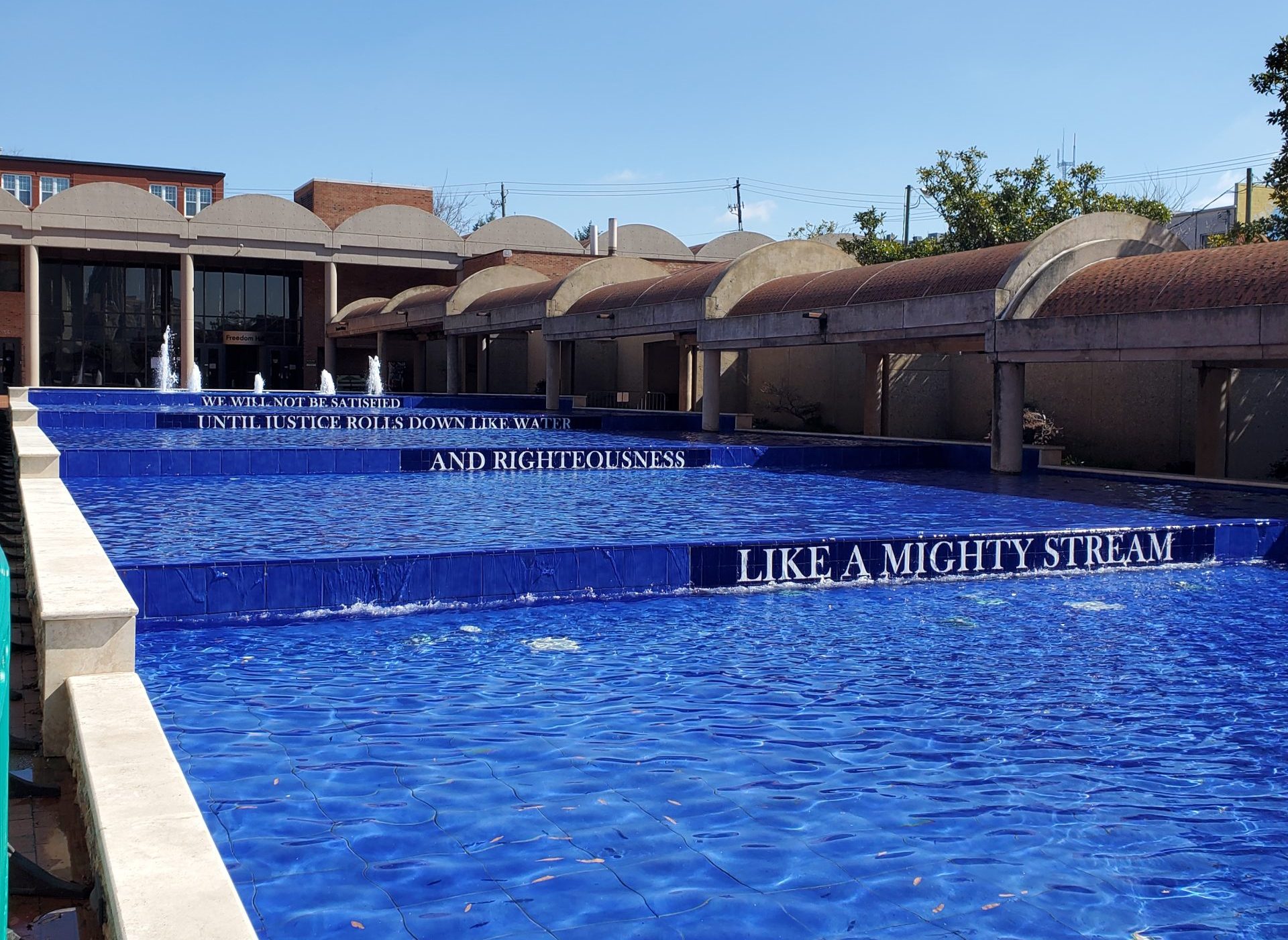
The following blog post is the expressed opinion of the writer and does not necessarily reflect the views of Tysons Interfaith or its members.
Dr. Martin Luther King, Jr.
On a road trip to the American South we recently saw the grave marker of Rev. Martin Luther King Jr. and his wife, which sits in a large pool of water next to the church where he (and his father before him) preached in Atlanta. Particularly powerful was a mural with his six principles of nonviolence, which in his view led to the “beloved community,” which is also described. One particularly powerful principle is #3, which says, “nonviolence seeks to defeat injustice not people.” We also thought the description of the beloved community is similar to what the interfaith movement seeks to achieve, where different faiths can cooperate to work toward common goals for “worldwide elimination of poverty and hunger and all forms of bigotry and violence.”
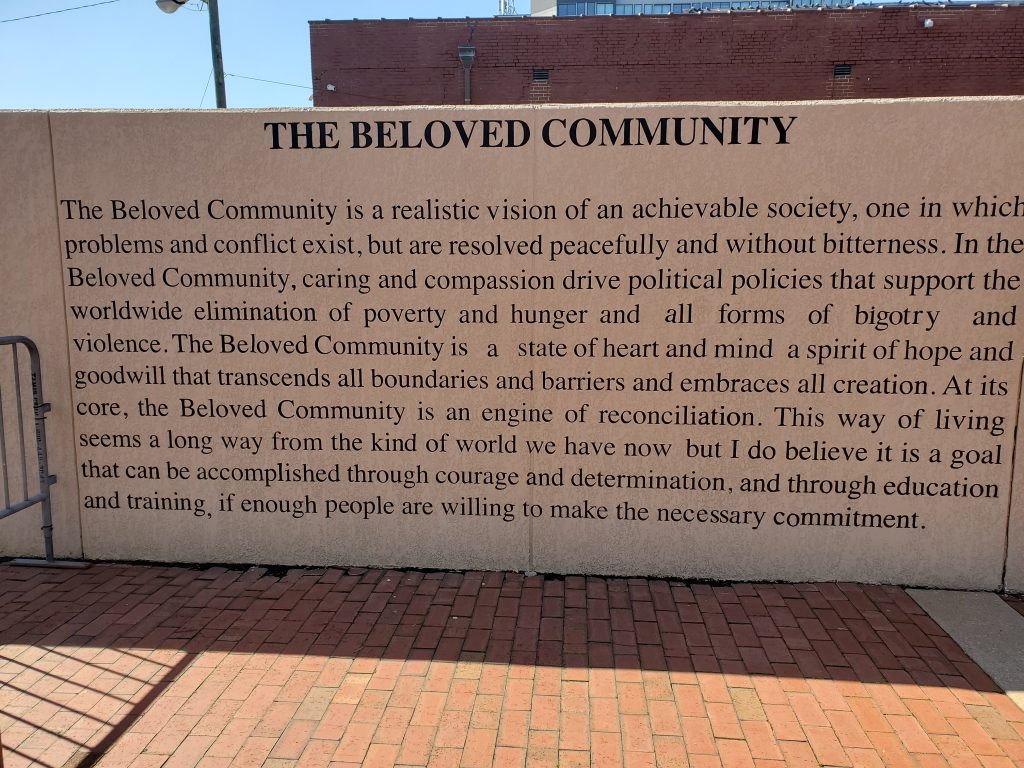
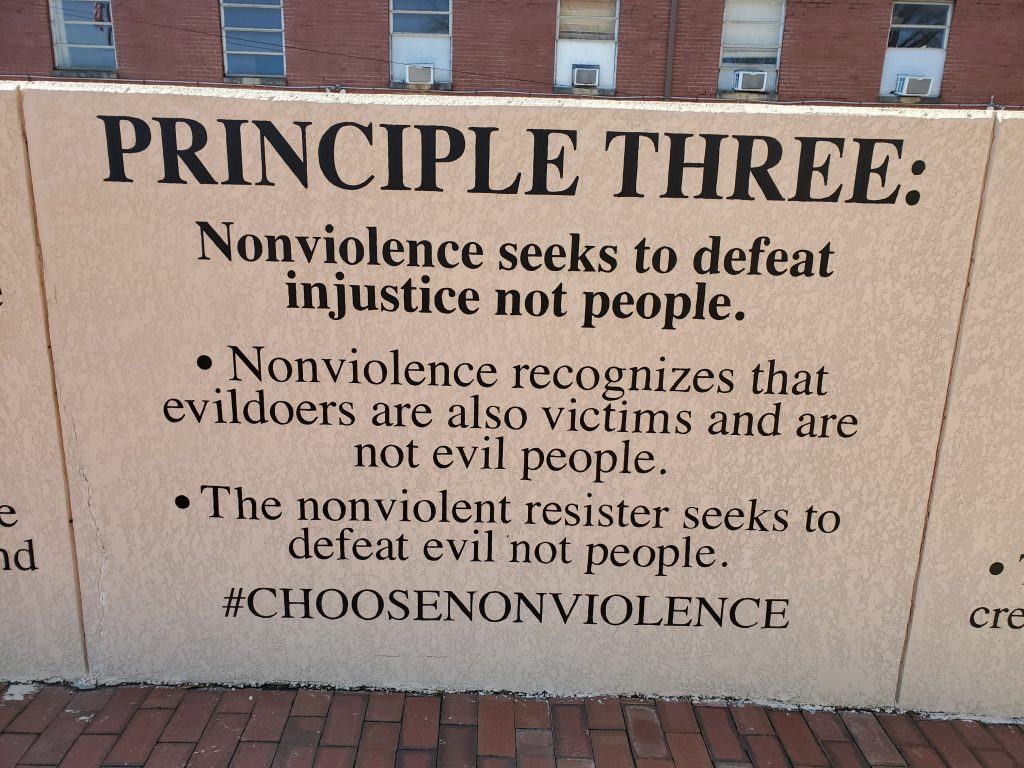
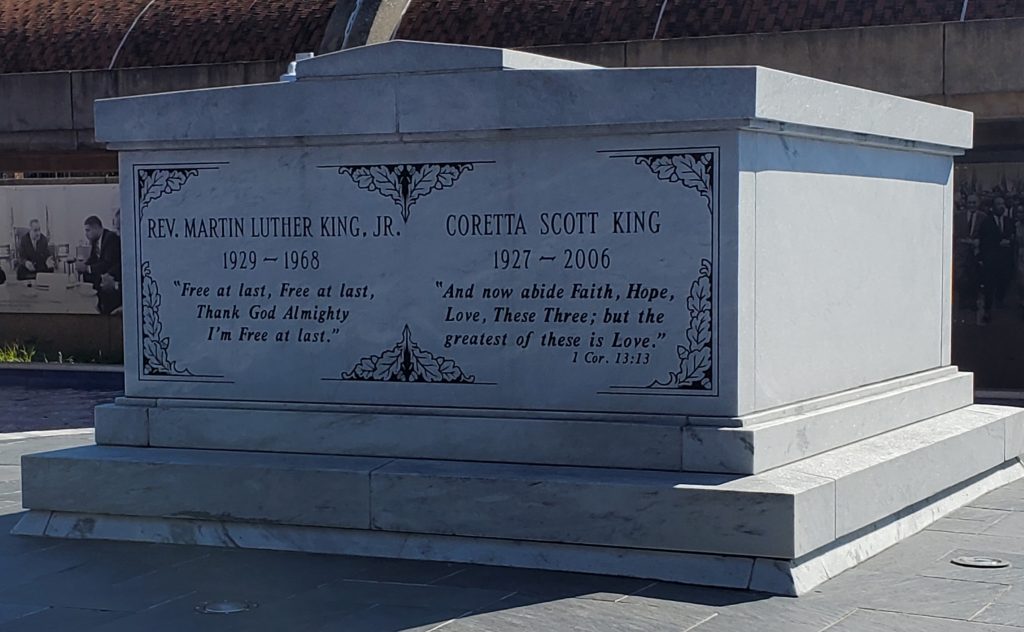
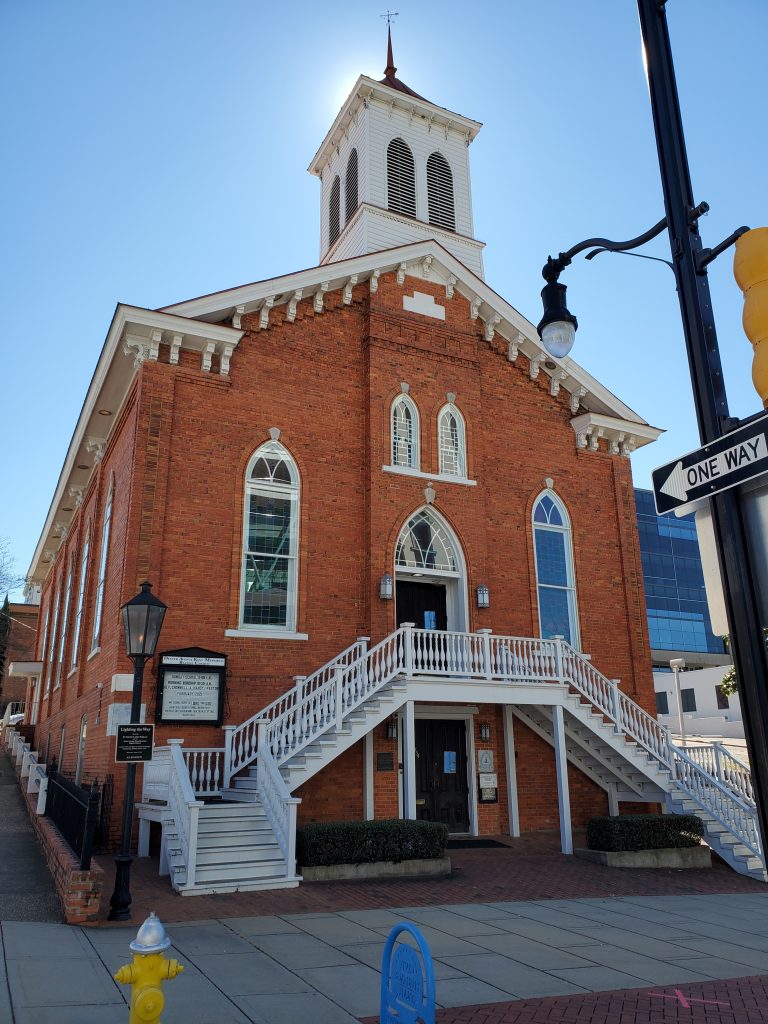
Picture of the Dexter Memorial Baptist Church in Montgomery, where Dr. King preached from 1954-1960, and where the Montgomery bus boycott was organized in 1955.
